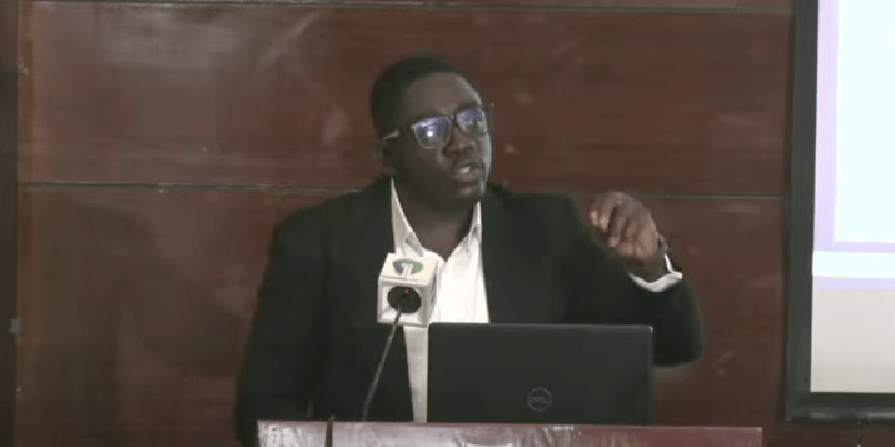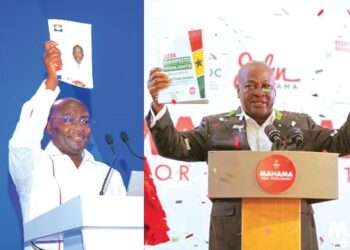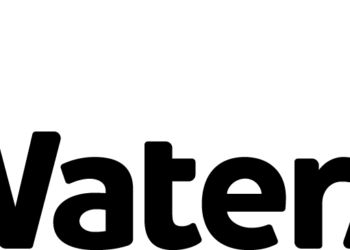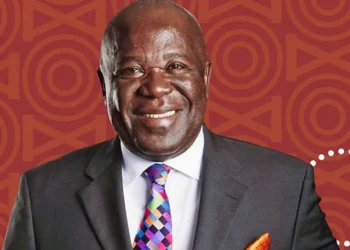The IMANI Centre for Policy and Education, a leading Ghanaian think tank, has presented an incisive critique of the ruling New Patriotic Party’s (NPP) economic manifesto, highlighting both the feasibility and the significant challenges in its proposed policies ahead of the 2024 general elections.
Dennis Asare, Senior Research Associate at IMANI, led the discussion, scrutinizing NPP’s economic promises and their potential impact, considering Ghana’s ongoing fiscal constraints and infrastructural needs.
The manifesto review is part of IMANI’s IMANIFESTO’ 24 projects, an initiative aimed at fostering transparency and accountability by evaluating political party manifestoes.
Cutting Government Expenditure by 3% of GDP
Dennis Asare explained that one of NPP’s bold promises is to reduce government expenditure by 3% of GDP, amounting to an estimated GHS 30 billion.
“One of the key things that NPP wants to do on the economy is that they want to cut 3% of GDP from government expenditure. That’s estimated around GHS 30,000,000,000. And if you look at our public expenditure, it is between compensation, debt servicing, goods and services, and capital expenditure.
“For the first two, had it not been that we stopped paying our external debt due to the debt exchange program first two, you couldn’t have done much about it. But the areas that we can do something about is the capital expenditure and goods and services”.
Dennis Asare Senior Research Associate at IMANI Centre for Policy and Education
Dennis Asare, however, pointed out that capital expenditure has traditionally been financed externally, with foreign funding comprising over 50% of Ghana’s capital projects from 2017 to 2023.
He questioned the availability of domestic private sector funds to cover this massive shift, especially when Africa is facing an estimated infrastructure financing deficit of $100 billion annually.
“The question remains whether the private sector is willing and able to take on this responsibility. If they are, the government will need rigorous monitoring systems to prevent contract overpricing and inefficiencies, given that single-source procurement, often lacking transparency, dominates high-value contracts in Ghana”
Dennis Asare Senior Research Associate at IMANI Centre for Policy and Education
He emphasized that without reforms in Ghana’s public procurement framework, including an independent oversight mechanism, the transition to private sector-financed infrastructure could exacerbate procurement inefficiencies and lead to cost inflation.
Fiscal Responsibility and the Proposed Fiscal Rule.
Another cornerstone of NPP’s fiscal agenda is reintroducing a fiscal rule to cap annual expenditure at 105% of the previous year’s budget. While this appears prudent, Mr Asare highlighted loopholes in the Fiscal Responsibility Act (FRA) that allow the Finance Minister to suspend the rule without a strict timeline for reinstatement.
To ensure sustained fiscal discipline, Mr Asare suggested tightening exit clauses in the FRA to minimize discretionary power and maintain adherence to fiscal targets. He also advocated for empowering the Fiscal Advisory Council with genuine independence, allowing it to provide oversight on major public expenditures.
“We need to make sure that we create a more robust, independent, and transparent procurement system to ensure that we address contract-over pricing and things like the political clientelism that has bedevilled our public procurement system. And so while this promise looks feasible, there are challenges in terms of the availability of private sector capital to actually do this.
“Then the second thing is the challenges we have in our public procurement system, which make it more complex and even difficult, and we would need a lot more smart monitoring if we want to effectively achieve this. Even though it looks doable, we need to monitor it so that we guard against overpricing”.
Dennis Asare Senior Research Associate at IMANI Centre for Policy and Education
Reforming the State-Owned Enterprises (SOEs)
The NPP manifesto promises to restructure State-Owned Enterprises (SOEs) through amendments to the State Interest and Governance Accountability (SIGA) Act. Dennis Asare pointed out that currently, Ghana’s SOEs have recorded losses of nearly GHS 14 billion in recent years, signaling deep-rooted financial issues.
According to Mr Asare, amending the SIGA Act alone would be insufficient, as it lacks strong mechanisms to enforce accountability and profitability within SOEs.
“We need to address the structural challenges, like partisan interference and lack of performance management, which are often overlooked but essential for meaningful reform,” he stated. He stressed that unless these structural deficiencies are tackled, the promised financial turnaround for SOEs is unlikely.

Local Government Finance Bill
The NPP also proposes passing a Local Government Finance Bill, which would grant Municipal, Metropolitan, and District Assemblies (MMDAs) the authority to borrow for revenue-generating projects.
However, Mr Asare noted that IMANI’s 2019 Social Accountability Report revealed that most MMDAs lacked the capacity to develop “bankable projects” to attract investors. He warned that granting borrowing power without enhancing these districts’ revenue-generating skills could place further financial strain on the government.
Mr Asare advised that, in addition to passing the bill, targeted capacity-building efforts are necessary to support MMDAs in revenue mobilization and project development.
Gold Purchase Program for Foreign Reserves
In a bid to shore up foreign reserves, the NPP manifesto pledges to continue the Bank of Ghana’s gold purchase program. This strategy involves buying gold from small-scale and sustainable mining sources to stabilize the cedi.
While small-scale mining production increased this year, Mr Asare cautioned that fluctuations in gold output and prices could undermine the effectiveness of this program.
He pointed out that although the gold purchase program might support reserve building, depreciation of the cedi has only slowed marginally—by about 3%—indicating that the strategy might be insufficient to address long-term currency stability challenges.
“Since large-scale miners require dollar-based capital, paying them in cedis would necessitate their reconversion to dollars, which could further destabilize the cedi. Thus, we need comprehensive planning to make this program effective.”
Dennis Asare Senior Research Associate at IMANI Centre for Policy and Education
NPP’s Proposed Flat Tax System
Additionally, the IMANI Centre for Policy and Education raised critical concerns over the New Patriotic Party’s (NPP) proposal to introduce a flat tax rate system in Ghana, ahead of the 2024 elections.
In an analytical review, IMANI cautioned that the plan, while potentially beneficial for business dynamism, poses significant challenges in ensuring fair and effective tax policy implementation.
The NPP’s flat tax proposal aims to replicate models like Estonia’s, a country that has garnered attention for its transparent and efficient taxation framework.
The flat tax system is designed to simplify tax compliance, offering a single tax rate across incomes, which theoretically enhances transparency and makes it easier for businesses to understand their tax obligations.
IMANI acknowledged that this feature could be advantageous in a complex tax environment like Ghana’s, which often hampers business operations with multiple overlapping tax regulations. However, IMANI cautioned that the proposed system could disrupt Ghana’s longstanding commitment to progressive taxation.
“A flat tax lacks progressivity, which means it doesn’t increase with income levels. This could potentially burden lower-income earners more than higher-income groups, reversing gains made in addressing inequality”
Dennis Asare Senior Research Associate at IMANI Centre for Policy and Education
The think tank emphasized that, unlike Ghana’s current tax structure, where wealthier citizens contribute a significantly higher share of tax revenue, a flat tax system might unintentionally place a higher proportional burden on lower-income earners.
IMANI pointed to a recent study by Ghana’s Ministry of Finance and some Development partners, which found that the nation’s tax regime, excluding excise duties, is predominantly progressive.
In this framework, individuals earning above GHS 240,000 annually contribute approximately 80 times more in taxes than those with incomes around GHS 4,000, upholding the principle that higher earners pay more. This foundational aspect of tax equity could be compromised if Ghana shifts to a uniform tax rate.
Another challenge IMANI identified lies in Ghana’s intricate corporate tax landscape, which contrasts sharply with Estonia’s straightforward approach. In Estonia, corporate income taxes are primarily levied on distributed profits—only when companies issue dividends.
By contrast, Ghanaian corporations are subject to a layered tax burden that includes corporate income tax (CIT) at 25%, a growth and sustainability levy, VAT, the National Health Insurance Levy (NHIL), among other taxes.
This multi-layered approach according to IMANI complicates the feasibility of implementing a flat rate, as Ghana’s tax obligations are not solely tied to corporate profits but extend to a variety of areas impacting different industries.
“Ghana has diverse sectors, such as agriculture, mining, and manufacturing, each with unique tax regimes,” IMANI remarked. “Applying a flat rate to all these sectors without accounting for their specific dynamics and contributions would be incredibly complex.”
Dennis Asare Senior Research Associate at IMANI Centre for Policy and Education
The organization further argued that a one-size-fits-all approach might disproportionately impact sectors critical to economic growth, potentially reducing their competitive advantage and discouraging new investment.
Beyond the structural issues, IMANI underscored Ghana’s weak tax enforcement mechanisms as a significant obstacle to the success of any simplified tax model. For Dennis Asare, Estonia’s flat tax system has been effective due to the country’s robust digital infrastructure, which allows for streamlined tax collection and compliance enforcement.
However, he noted that in Ghana, the absence of strong enforcement measures poses a significant challenge, adding that between 2021 and 2023, tax-related irregularities accounted for approximately 90% of financial discrepancies in Ghana’s Ministries, Departments, and Agencies (MDAs), according to IMANI’s fiscal recklessness report.
These irregularities Mr Asare opined highlight the prevalence of tax evasion and poor enforcement, which the think tank believes would need to be addressed before any flat tax system could succeed.
“The effectiveness of a flat tax system in Ghana hinges on rigorous compliance and enforcement capabilities, which we currently lack. Our fiscal accountability will only improve when we strengthen these core areas, not by merely adopting systems from other countries without addressing our foundational issues.”
Dennis Asare Senior Research Associate at IMANI Centre for Policy and Education
Finally, IMANI pointed out that tax cuts do not necessarily lead to increased revenue mobilization, using recent Ghanaian history as an example. Dennis Asare Senior Research Associate at IMANI Centre for Policy and Education pointed out that when the NPP government abolished seven taxes between 2017 and 2020 to ease business constraints, the expected revenue boosts did not materialize, and revenue targets frequently fell short.
IMANI argued that the reduction in tax rates without corresponding improvements in compliance and enforcement capabilities risks widening the fiscal deficit rather than achieving economic growth.
The Road Ahead for Fiscal and Economic Management
While IMANI acknowledged that some of the NPP’s proposals are feasible with strong policy adjustments, the think tank expressed concerns over implementation challenges, funding sources, and Ghana’s procurement transparency issues.
In the absence of a rigorous fiscal monitoring system, enhanced procurement standards, and structural reforms for SOEs, IMANI contended that the manifesto’s promises might not yield their intended economic impact.
As Ghana approaches the December 2024 elections, IMANI’s critical analysis of the NPP manifesto serves as a wake-up call for voters and policymakers alike to demand clarity and accountability.
Through IMANIFESTO’ 24, IMANI continues to spotlight the need for realistic, transparent, and sustainable policies that go beyond electoral promises to address Ghana’s economic challenges comprehensively.
READ ALSO: Cedi Stumbles, Dollar Soars As Trump’s Potential Return Fuels Currency Clash





















